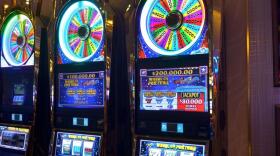The second full budget cycle with two full-scale casinos operating in Massachusetts won't be as fruitful as the first. The Baker administration is projecting that gaming revenue will decline in fiscal year 2021 as the casinos that have underperformed to this point work through what their owners say are growing pains.
Gov. Charlie Baker's fiscal year 2021 budget proposal (PDF) counts on about $283 million in tax revenue from gaming — $11 million or 3.75% less than the gaming revenue total of $294 million assumed in the current budget. That suggests the Baker administration doesn't quite buy into casino operators pledges that their underperforming facilities are still ramping up.
Less than nine years since Massachusetts legalized casino-style gaming and only about 17 months since the state's first resort casino opened, gaming revenues are staring down a year-over-year decline and the state could see the tax benefits of expanded gaming plateau under the $300 million a year mark, short of the estimates proponents used in the years-long effort to bring casinos to the Bay State.
The administration is expecting MGM Springfield and Wynn Resorts' Encore Boston Harbor in Everett to jointly generate $213.8 million in state taxes during fiscal 2021 from about $855 million in gross gaming revenue, according to a budget-planning spreadsheet shared with the News Service.
Encore accounts for more than 70% of the total, expected to generate $611.2 million in gaming revenue to MGM Springfield's $244.1 million. Full-scale casinos in Massachusetts are taxed at a rate of 25% of their gross gaming revenue.
Plainridge Park Casino, the slots parlor in Plainville, is expected to generate $68.9 million in state taxes from $140.7 million in gross gaming revenue — both down more than 16% from the slots parlor's fiscal 2019 performance. Plainridge is taxed on 49% of its gross gaming revenue.
In total, Massachusetts gambling facilities are expected to pull in just under $1 billion in gross gaming revenue in fiscal year 2021, the administration projects.
When expanded gaming was a topic of debate on Beacon Hill almost a decade ago, proponents like Treasurer Steven Grossman and Salem Mayor Kim Driscoll representing for the Coalition for Jobs and Growth said the state could count on about $400 million in annual taxes from the casinos and slots parlor. Those projections assumed the state would license all three full-scale casinos the law authorized, but the Gaming Commission has never issued the third and final casino license.
Executives from MGM Springfield and Encore Boston Harbor have previously said that their properties are still building up to their full revenue-generating power. Former MGM Springfield head Michael Mathis and former Encore head Bob DeSalvio each had said their casinos needed more time to prove themselves, but both are now out of their jobs.
"We've grown the market. We've missed some of our numbers and I think we're trying to figure out where the market is and where it's going to go and how long it's going to take to get there, but there's definitely opportunities to bring new customers into this business," Mathis said in a radio interview late last year.
Baker's budget proposal also includes an outside section that changes where some of the casino revenue will be deposited. Under the budget policy section (section 21), 15% of the state's tax revenue from the full-scale casinos — MGM Springfield and Encore Boston Harbor in Everett — would be deposited into the Commonwealth Transportation Fund instead of the Transportation Infrastructure and Development Fund.
The change essentially diverts incoming casino taxes from an account that is required to supplement municipal transportation work and instead funnels it into a more broad transportation account that has no specific requirement to assist in local projects.
The administration said the switch gives them greater flexibility to spend the money on a variety of transportation-related needs, and that much of the money still supports local road and bridge improvements.
The same language has been adopted in fiscal 2019 and fiscal 2020 — the two budget years in which the state has collected category 1 gaming tax revenue — and Baker's budget office said that $14.7 million in casino revenue deposited into the Commonwealth Transportation Fund in FY19 contributed to the budget surplus from which the administration proposed $40 million in supplemental Chapter 90 funds for cities and towns.
Baker's budget office estimated that the portion of gaming revenues deposited into the Commonwealth Transportation Fund in fiscal 2020 and fiscal 2021 (if the outside section is again approved by the Legislature) will equal $32.1 million each year. Officials said those deposits will support the $77.6 million in new transportation investments included in Baker's fiscal 2021 budget proposal, including snow and ice removal, and debt service payments on transportation improvements.
This report was originally published by the State House News Service.






